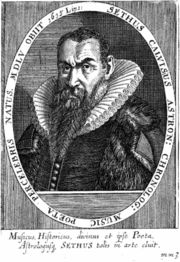

Theorist, Worked briefly in Leipzig, then for twelve years, beginning in 1582, in Schulpforta. In 1594 became Kantor of the Thomaskirche in Leipzig. Best known for Melopoeia sive melodiae condendae ratio, quam vulgo musicam poeticam vocant (Erfurt, 1592), based on Zarlino's Le istitutioni harmoniche and including a chapter on poetic and musical figures and their relationship. Discusses modes and the history of music theory in Exercitationes musicae duae (Leipzig, 1600). Also wrote purely didactic musical treatises. Composed pedagogical works, bicinia and tricinia, 4-part settings of the Psalms and of sacred hymns and songs in Latin and German, and a few motets.